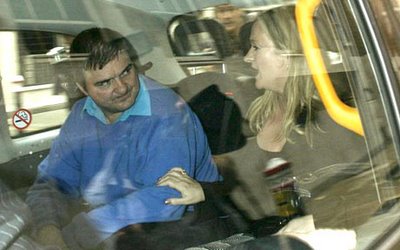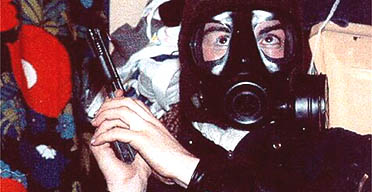Justice at last for Barry George, but still none for Jill Dando.
 Did anyone, except for the Metropolitan police, the lawyers at the Crown Prosecution Service that authorised the original charge, 10 members of the original jury, and the judges that rejected his first appeal believe that Barry George was guilty of the murder of Jill Dando? Perhaps a better question now would be how many of those aforementioned organisations and individuals still believe that Barry George *is* guilty of the murder of Jill Dando.
Did anyone, except for the Metropolitan police, the lawyers at the Crown Prosecution Service that authorised the original charge, 10 members of the original jury, and the judges that rejected his first appeal believe that Barry George was guilty of the murder of Jill Dando? Perhaps a better question now would be how many of those aforementioned organisations and individuals still believe that Barry George *is* guilty of the murder of Jill Dando.For it certainly seems that the police and the CPS, despite everything, continue to be willing to defend their horlicks of a case, even after it has finally been proved to have been one of the most rotten and circumstantial to have come before a court in recent times. The only evidence that even slightly linked George to Dando were the single particle of "firearms residue discharge" found in one of his jacket pockets when his home was searched, evidence which was later ruled inadmissible because of the potential for contamination, and a single fibre found on Dando's raincoat, which the prosecution claimed came from a pair of C&A trousers found, again, when they searched George's flat.
George, like others before him, such as Colin Stagg and Stephen Kiszko, seems to have been picked up for little other reason than the fact that he was considered to be the local oddball. George certainly was weird: as a result of both his low IQ and a personality disorder, he went through a phase of passing obsessions, one of which during the early 80s was with guns and militaria. Later he became infatuated with Queen, and regularly claimed to be Freddie Mercury's cousin, going so far as to change his name by deed poll to Barry Bulsara. He also, as the court heard, followed local women and took photographs of them, on a number of occasions harassing them to such an extent that they either became frightened or agitated. During the 80s he was imprisoned for attempted rape, a crime he pleaded guilty to, and a neighbour also claimed that he had assaulted her.
None of this however even begins to make the case that he was a murderer, let alone the murderer of Jill Dando. The murder weapon itself was never found, and apart from the infamous photograph depicting him in a gas mask with a starting pistol and the magazines, both from the 1980s, there was nothing to suggest that George had owned any weapons for years. What was clear was that the murder of Jill Dando was a carefully planned and executed assassination, of the type that suggests that it might well have been professional. The very last adjective you would use to describe George would be professional: tests on his memory, planning and carrying out tasks suggested that he was in the lowest 1% of the population. George also never hid his obsessions; he talked about them incessantly, to anyone who would listen. Not only did he never speak of Jill Dando, but if he had killed her, for him to both successfully get away with it for nearly a year and also not mention it to anyone would have been extraordinary. Memorably, Paddy Hill, one of the Birmingham Six, said that you wouldn't trust George to go to Tesco, let alone to carry out such a meticulous murder.
After 8 years, George has finally been proven to be completely innocent. Prison is bad enough when you're guilty and able-bodied; for George it would not be an exaggeration to describe it as his own personal hell. Like other victims of miscarriages of justice, what they don't want so much as compensation is an apology from those who first investigated them, who rubber-stamped the prosecution, and who, in George's case, have continued to defend the case even after they have been found to be not guilty. To do so however would be to admit that the police, completely stuck, did the clichéd thing and either decided to deliberately fit up the local nutter, or saw what they wanted to see in the flimsy forensic evidence which they collected. Some sections of the media have spent a lot of time of late decrying the Portuguese police for their bungled investigation into Madeleine McCann's disappearance, criticism which although valid in some places has also bordered on the xenophobic. Like in Praia da Luz, the trail of the real guilty party has long gone cold. You can rest assured that tomorrow London's finest will not be receiving the same levels of opprobrium that their investigation surely deserves.
Labels: Barry George, Jill Dando, miscarriages of justice


